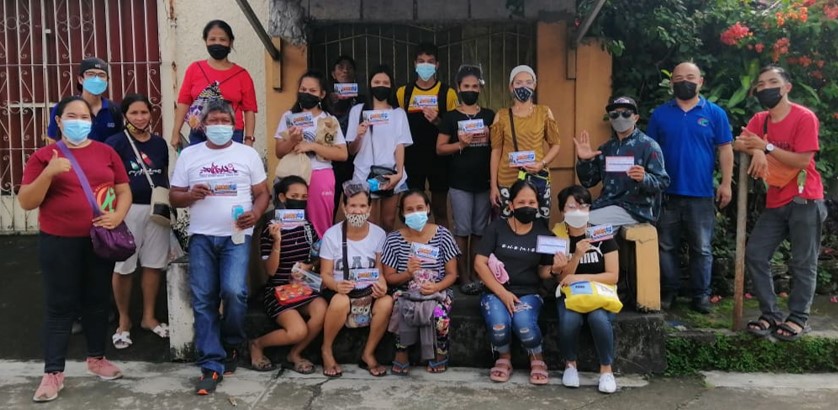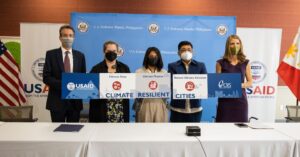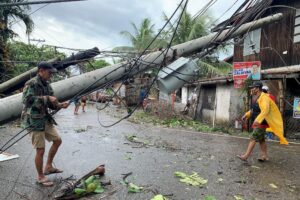Caloocan City is one of the biggest and most densely populated cities in the Philippines. According to the 2018 official poverty statistics of the Philippine Statistics Agency (PSA), it has a total population of 1.6 million and a poverty incidence of 4.7%, the highest in the National Capital Region.

When the COVID-19 pandemic hit the country in March 2020, the enhanced community quarantines aggravated the situation of poor households especially those living in urban centers. As observed by the United Nations, people who are most vulnerable to food and nutrition crises during the pandemic are those who were already exposed to critical food and dietary deprivations pre-pandemic. It was in this setting that an informal coalition of civil society and private sector organizations, already providing relief operations on their own, came together to strategize and collaborate to address the need for food among poor families in Metro Manila.
Ensuring food security
As an informal alliance of different CSOs and NGOs, the CSO coalition was organized to coordinate and manage relief efforts in affected communities in NCR. To address the hunger situation and revive small businesses, the group embarked on “Project Karinderya”, which brought safe and nutritious food to urban poor households while helping the karinderyas (food stalls) recover from the slack in business.
“During the first year of the pandemic, the CSO coalition focused on food security and livelihood,” CSO coalition Project Manager Kathleen Loresca said.
In Bagong Silang Caloocan, the largest barangay in the country, the coalition supported Kabuhayan sa Ganap na Kasarinlan Credit and Savings Cooperative (K-COOP) to provide hot meals to thousands of residents and establish community kitchens that has fed families for a month.
The Project Karinderya, which provided income to food stall owners while feeding families, was also replicated in around 200 barangays in Metro Manila and nearby provinces.
A similar initiative, the Super Carinderia, is being implemented by PBSP in partnership with Affiliated Network for Social Accountability in East Asia and the Pacific (ANSA-EAP), and Samahan ng Nagkakaisang Pamilya ng Pantawid, which was initially done in NCR and is now currently being replicated as far as Iloilo, Negros Occidental, and Marawi City.
Project CAHEL
Aside from ensuring food security, barangay health teams were also trained on preventing further spread of the virus.
Led by the Zuellig Family Foundation (ZFF), Peace and Equity Foundation (PEF), and K-COOP and the Caloocan City LGU, the Caloocan Consortium to Alleviate Health and Leadership or Project CAHEL was launched in June 2021. A six-month training included two modules of the Barangay Health Leadership and Management Program for Pandemics as well as learning sessions on contact tracing, triage and referral system, mental health awareness & psychosocial support, dengue awareness and management.
Caloocan Vaccination Partnership
To ramp up its support to the national vaccination plan in 2021, the coalition also partnered with the local government of Caloocan City to provide technical assistance, conduct information campaigns, generate demand for vaccines, and address logistical issues in the vaccination sites.
The Philippine Disaster Resilience Foundation (PDRF), with Task Force T3 (Test, Trace and Treat), shared their technical expertise on planning, allocation and monitoring performance of their vaccination campaign through the Miñana Matrix, a tool to determine targets in vaccination efforts. The CSO coalition also created an online map of vaccination sites in Caloocan and devised a system for contact tracing and mapping locations for granular lockdowns.
To deal with vaccine hesitancy, KCOOP initiated information, education, and community campaigns by releasing COVID-19 facts and figures to their client members in their communication channels, particularly, online chat groups composed of mothers in the community.
“Most of KCOOPs client members are “nanays” (mothers). They became “infomediaries” to enlighten their communities that vaccines are safe and effective, and there is a need to get vaccinated to protect yourself and others,” Loresca said.
The Microfinance Council of the Philippines (MCPI), meanwhile, introduced to the CSO Collab through KCoop General Manager Ms. Maria Anna Ignacio, also mobilized their members to help generate demand for vaccination among their clients through the conduct of IEC campaigns.
With the increase in demand, the LGU then provided slots in dedicated vaccination sites to the Collab partners’ members As the vaccine supply stabilized in NCR towards the last quarter of last year, KCOOP brought its client-members from the nearby province of Bulacan when Caloocan City opened its vaccination sites to residents outside the city. Transportation expenses were shouldered by members of the CSO coalition like the Philippine Business for Social Progress.
Through linkages with the Jollibee Group Foundation, service crews from the Jollibee Foods Corporation were also vaccinated along with Food Panda riders, as well as some employees of coalition members.
With these efforts, over 2,000 individuals were vaccinated in Caloocan.
Addressing challenges in the vaccination sites
The CSO coalition also stepped up its efforts to address the lack of equipment and manpower in the vaccination sites.
To help encoders of the local government, PEF, through K-COOP, provided 27 laptop units for the vaccination project’s database management component. The CAMANAVA chapter of the Philippine College of Physicians, at the same time, helped in the enlistment of 32 medical volunteers for the vaccination centers in Caloocan.
The SEAOIL Foundation Inc. also provided e-vouchers for fuel worth P50,000 to help transport COVID-19 vaccines to vaccination centers.
Replicating the efforts
The coming together of the development organizations to help the local government, plus the impact of the effort to improve the vaccination in Caloocan have prompted replication in other areas.
In November 2021, another vaccination partnership was initiated in Padre Burgos, Quezon, a PEF focus area. Together with MCPI and the CSO coalition, PEF coordinated with the municipal Rural Health Unit, local MFIs, and partner cooperative Yakap at Halik Multipurpose Cooperative Quezon 2 to vaccinate residents.
According to Loresca, the CSO coalition will be working with other LGUs to replicate the efforts.
“For Caloocan and Padre Burgos, we have seen the potential of microfinance institutions in increasing vaccine coverage. The Department of Health, World Health Organization, and Task Force T3 are looking forward to engaging these MFIs in areas with low vaccination rates,” she said.
The Caloocan LGU was also invited by the Association of Foundations in a forum to discuss their model and share experiences to inspire creation of similar efforts.
With the learnings from the collaboration, more cities and municipalities are expected to produce partnerships that can have multiplier effects to their own efforts.
Article by Peace & Equity Foundation


